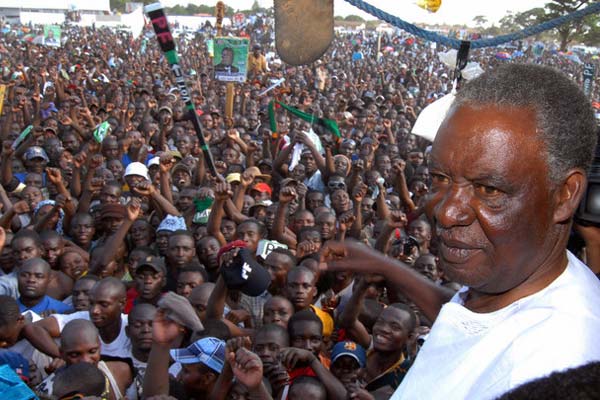The Zambian declaration: It’s time for change – By Jacqueline Muna Musiitwa

As a child growing up, I recall the fervor and momentum around Zambia’s first democratic multi-party election which took place in 1991. I remember running in the streets chanting, “The time is now…It’s time for change” and other chants focused on the people’s hope for a better future. Little did I understand politics, much less political evolutions or revolutions. In the last 20 years both Zambia and the world have changed, becoming more loosely bound. We continue to witness the globalization of ideas, politics, economics, social systems, culture, technology and disease. If the Arab spring has taught us anything, it is that leadership is about responsibility and not power. Failure to be responsible results in removal from power. This year I have witnessed another change of sorts in Zambian politics. In a relatively peaceful election Zambians made it known that once again it was time for change. The election process demonstrated to me Zambians’ choice to hold leadership accountable for its actions.
The one thing that has remained constant in the lives of all Zambians is the desire to make a better life for themselves. The ever present consensus in African political discourse is that our leaders are the cause of our problems. Although in part true, leaders alone must not take all the blame. As Aldous Huxley said, “People get the government they deserve.”
Considering many African countries’ battle with national self esteem, questionable degrees of patriotism and nationalism, as Manchester United, Arsenal and Chelsea games have a larger following than parliamentary proceedings, one can only be cautiously optimistic. Based on the assumption that Zambians are committed, inspired and willing to work hard together towards national development, it still begs the question, how can “˜we the people’ ensure the leaders are for the people, of the people and guided by values and ethics (including, but not limited to, transparency and accountability)?
The first step is to consider the words of Barack Obama, “We must educate our children to become like young Egyptian people….” This does not mean taking to the streets, it means uniting young people together for a common cause despite existing differences. The days of silent children who are seen and not heard are gone – younger generations now know that they are an influential and growing part of “˜the people’. It also means understanding and demanding civic rights, obligations and privileges under the law while using the appropriate means to express grievances. People’s rights need to be taught in schools and other community fora. The second step is to foster independent institutions buttressed by a strong civil society, free press and unrestricted access to social media. It is through open debate of the issues that people effectively contribute as active and responsible citizens. People need to express and advocate the views of a diverse cross-section of the population without fear or threat of prosecution. A good example of this is Rwanda’s “˜National Dialogue’ – a process that invites people to converse with government through phone calls, text messaging and email (domestically and from the diaspora) about national challenges, successes, lessons learned and future plans.
Often in Africa political leadership is disconnected from the realities of the people. Being surrounded by a convoy of security in a vehicle with tinted windows or a helicopter because there are no roads to the region for the rare opportunity to visit a village, (that prepares for weeks on end for the visit), is hardly a depiction of the people’s reality. President Sata, was in part voted because he appears to be “˜a man of the people’. In his first ninety days, people have been watching with anxiety the reforms the government is making. So far the new government is demonstrating its commitment to unifying past political fractures – renaming the airports with names of the founding fathers, whilst demoting military officials that were allegedly unqualified for their posts suggests that a meritocracy could be developing, thus minimizing corruption and nepotism in hiring practices. Clearly outlining and enforcing the terms and conditions for investors entering into Zambia, especially the Chinese, thus protecting Zambia’s greatest resource, its people, at the forefront of the agenda demonstrates the government’s commitment to sustainable development.
All of the above are great starts, however, the development agenda, be it Vision 2030 or the Millennium Development Goals, need to be accompanied by an active and realistic plan of how to accomplish them. Such a plan is not yet clear. Additionally, the needs of the people change over time, and government must take that into consideration whilst still focusing on such visions. There need to be checks and balances, monitoring and evaluation of leadership performance. And ultimately it is up to the people to gauge when it is time for change and be the necessary agents of change.
Jacqueline Musiitwa founder of Hoja Law Group is a Mo Ibrahim Leadership fellow, a World Economic Forum Young Global Leader and an Archbishop Tutu fellow.







[…] Article first published at African Arguments […]
Well-written thoughts, and thank you for sharing as I have just learned of Rwanda’s ‘National Dialogue’, of which we Zambians could emulate and adopt. I’m a keen admirer of the metamorphosis of Rwanda’s economy and work culture (particularly impressed by their RNIC program and the unique leadership qualities of His excellency Paul Kagame). Like you’ve rightly quoted from A. Huxley that “People get the government they deserve.†We as Zambians would need to find a way of retuning our attitudes and mind sets, which would enable us support the current government towards national progress for all of us. Also on leadership performance M&E, the Zambian government in turn needs to learn from other countries, like the Knowledge-driven nations* (S.Korea, Finland etc), some of which were once upon a time confronted with political and economic turmoil, but today are advanced in the global marketplace. This has been due to taking the appropriate measures (policies, institutional restructuring, reforms) relevant to the prevalent macroeconomic conditions at the time, with particular growing emphasis on education. Today they have systems that engage dialogue with appropriate groups of people depending on level of interventions/programs. A number of Zambian policies and national priorities need to be reviewed. The Finnish use evaluation at the national level as a learning tool and have a wide culture of transparency and accountability which nurtures a high level of citizen participation. They have for instance, a public review of M&E by national audit office, parliament, group of academics and civil society orgs. A break down of some of these and more economic-growth enablers of their agenda is what the new government needs to communicate with and to the people. They also need to show the match between their intended interventions (immediate, short-term, long-term) and the current macroeconomic environment that Zambia is in.
* According to the SNDP, Zambia is striving to be knowledge-driven between the years 2015 -2030
I recommend a good read, if you have not already – ‘Entrepreneurial Solutions for Prosperity in BoP Markets’ by Eric Kacou